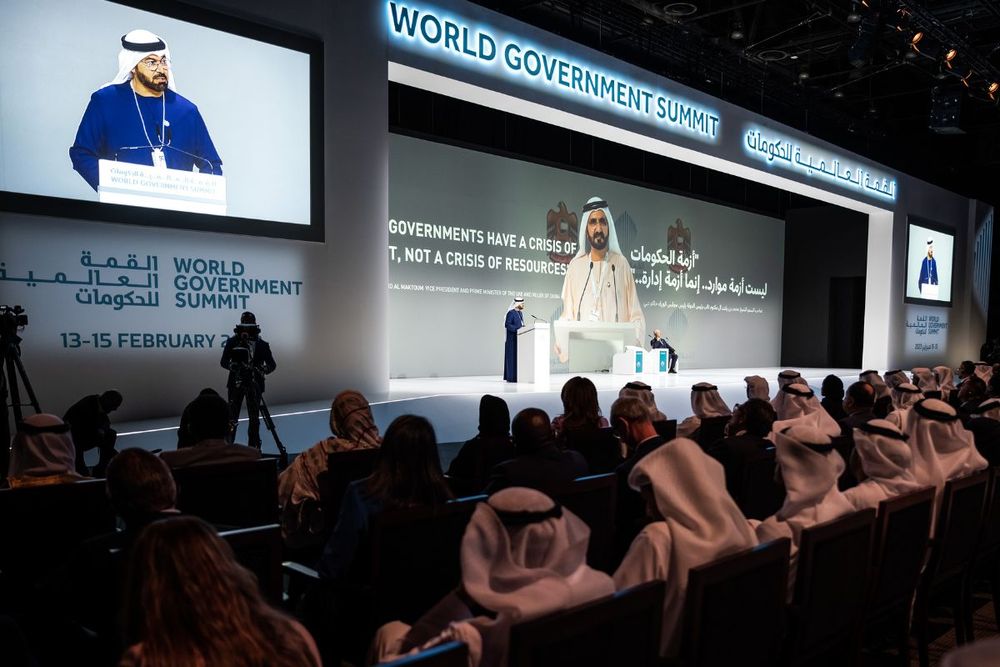Mohammad Abdullah Al Gergawi, the UAE Minister of Cabinet Affairs, and Chairman of World Government Summit (WGS) Organization, highlighted the rapid change that the world has witnessed over the last 10 years since the inception of the Summit.
During his opening session “A Decade of Change” on the first day of the 10th WGS, Al Gergawi identified five key transformations that will change the future of the world over the coming years as a result of the rapid technological development.
The first transformation, he said, was climate change, which could displace more than 1 billion refugees by 2050, costing $23 trillion loss for the world.
“Recognizing this pressing issue, the UAE named 2023 as the “Year of Sustainability”, and within its role in addressing this global issue, it will host COP28,”
said Al Gergawi.
Al Gergawi added that the second transformation is the emergence of a new economic landscape.
“We are heading towards a new economic landscape with new blocs of strong economic and global influence that will divide the world into different financial and economic systems, forcing governments to make decisive economic, technological and geopolitical decisions.”
Population Growth will be the third transformation, the minister said.
“This means that the concentration of new megacities will be in the developing countries in Asia and Africa at a rate of 86 percent. This is a huge challenge for these countries and an opportunity if governments can make use of their human resources.”
Future jobs
The fourth transformation is the radical change in the concepts of illiteracy and skills.
“Illiterates will be those who cannot deal with Artificial Intelligence (AI) techniques. In the next decade, we will have tens of millions of vacant jobs due to the lack of proper skills in potential candidates. For governments, unemployment will not only necessitate creating jobs but also introducing the appropriate technical skills and capabilities that would qualify individuals for future jobs,”
Al Gergawi.
Al Gergawi identified AI as the fifth transformation, which will determine the power and future of governments.
He added there will be proactive governments adopting AI techniques or underdeveloped governments that will live alone in a world similar to the ancient ages.
“The power of governments will be measured by their ability to adopt technology,”
he said.
Al Gergawi noted that global average rate of government readiness for AI is less than 50%, stressing that governments’ adoption of AI technologies has become inevitable.
“It is no longer an option, and many governments have lost the battle of trust to companies because of their delay in adopting advanced technologies.”
Vital role
Al Gergawi noted that the world has witnessed a 5000 percent increase in data production compared to the last decade. Data plays a vital role in shaping politics and the economy and providing government services, the minister said.
“Whoever owns data owns the future,”
Al Gergawi added.
“Compared to the day we launched the first edition of the WGS, our reality, expectations, and our understanding of the future have drastically changed. We have witnessed events that the world did not expect, and events that changed the global landscape in various fields. We also witnessed accelerated developments even faster than we could have imagined. The world witnessed unprecedented rising temperature and natural disasters that cost humanity losses amounting to $3 trillion,”
added Al Gergawi.
He said:
“The COVID-19 outbreak has cost the world millions of lives and economic losses that exceeded $12.5 trillion. Unfortunately, the Russia-Ukraine war we are witnessing today is expected to cost the world about $2.8 trillion losses, with rising fears of a nuclear war. Today, we are also witnessing the highest inflation rates in years, with the highest food prices we have seen in 60 years.”
Virtual migration
Pointing to the rapid technological advancement within the past decade, Al Gergawi said that four billion people have migrated to the virtual world, with more than half the world’s population on social media. The AI revolution and the emergence of new technology applications will give everyone skills they never expected to possess, and will affect many sectors.
He concluded:
“I used to say we are in the first second of the first minute of the first hour of the first day of the first year of the technological advancement. Now I can safely say we have moved to the 2nd second of the first minute of the first hour of the first day of the first year of this revolution. And we shall witness the rise of many transformational shifts.”
Global Summit
This year, WGS brings together more than 20 heads of states, 250 ministers, and 10,000 businessmen, global experts, and thinkers. It also features more than 22 global forums with the participation of leading experts in various fields.
Through more than 220 main sessions with the participation of 300 international speakers including presidents, ministers, experts, thinkers and future makers, the summit showcases the current and future global challenges, and discusses the best ways to develop government performance, based on the latest developments and future trends, with the aim of helping humanity overcome the challenges of reality to a better, more developed, prosperous, and secure future in various sectors.
News Source: Emirates News Agency









